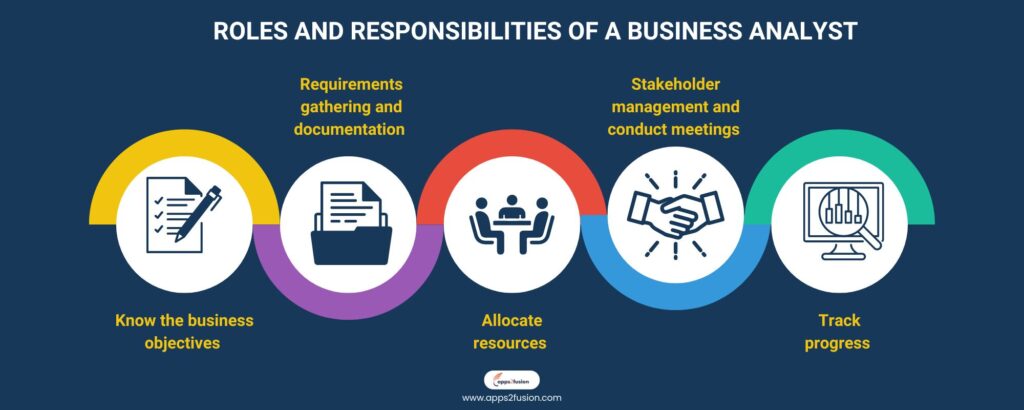Business Analyst: Roles and Responsibilities
A business analyst bridges the gap between IT and ‘business’ and engages in a wide variety of tasks to improve the efficiency and quality of services being delivered to the customer. It is often misinterpreted that ‘business analyst is the same as a project manager’, but there is a subtle difference between the former and the latter.

What does a business analyst do?
A business analyst (BA) works closely with business stakeholders and key users throughout the implementation process and acts as the face of the service provider. Some of the key roles and responsibilities of a BA are highlighted and explained below:

Know the business objectives
A BA must understand the business objectives and customer’s expectations from the implementation of a new ERP System. The objective must be clear and precise to define the scope of work—project-specific activities, deliverables, and timelines for implementing the project. A mistake or an incorrect assumption at this stage could result not only in an increase in cost but also can at times put the whole project at stake.
Requirements gathering and documentation
A business analyst, in an implementation project, studies the business requirements by discussing them with the key users spread across different departments in an organization and documents those concisely according to the industry standards. It is important to get the customer’s consent on the documents to ensure that all their needs are correctly interpreted and properly addressed in the documentation. Requirements include both functional and non-functional aspects.
Allocate resources
It is certainly important to allocate the required resources to the project, of course keeping the project budget in mind. Resources include the development team, configuration team, testing team, the center of excellence, etc. A BA will provide all the required information to the aforementioned teams and provide suggestions and improvements based on customer feedback.
Stakeholder management and conduct meetings
Another key responsibility of a BA is to maintain a good relationship with the stakeholders. He/She will have to organize and conduct meetings with stakeholders. They need to build the right agenda for the meetings and circulate it in advance, only to the necessary audience, with the required background so that they can come prepared for the meetings. Listening patiently to them throughout the meeting, will eventually build trust . Maintain transparency and clearly articulate what is feasible to deliver and what is not with supportive references to convince them.
Track progress
A BA will always have to monitor the Project’s progress and makes sure that project deliverables meet quality standards and customer requirements. Identifies potential risks that may come up during the implementation process and develops appropriate mitigation plans. Communication with Customers plays a vital role in the Implementation process to avoid any hindrance that could affect the project’s progress.
Considering a career in cloud?
Some of the key documents that a business analyst prepares are stated below
- Business requirements document
- Functional and non-functional requirements document
- Business process mapping document
- Target operating model
- Conceptual design document
- Technical design document
- Gap analysis document
- Change request document
- Training materials
- Handover documentation








